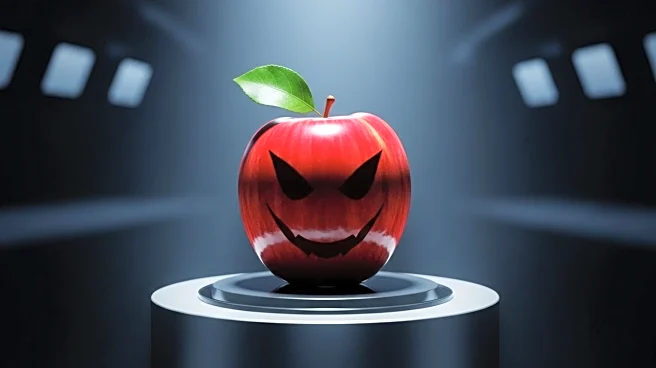What's Happening?
The film 'Bad Apples,' starring Saoirse Ronan, premiered at the Toronto Film Festival, showcasing a dark comedy narrative. Directed by Jonathan Etzler and written by Jess O'Kane, the movie follows the story of a teacher, Marie, played by Ronan, who impulsively locks an unruly student, Danny, in her basement. The film explores the absurdity of the situation as Marie becomes a star teacher due to the absence of Danny, who was disrupting her class. The narrative unfolds with Marie attending school meetings where Danny's disappearance is a hot topic, yet she remains silent about his captivity. The film balances dark humor with the absurdity of the situation, highlighting Ronan's comedic chops.
Why It's Important?
The film 'Bad Apples' is significant as it marks a departure for Saoirse Ronan, known for her dramatic roles, into the realm of dark comedy. This genre shift showcases her versatility as an actress and could influence her future career choices. The film also highlights societal issues such as the challenges faced by educators and the impact of disruptive students on classroom dynamics. By presenting these themes through a comedic lens, 'Bad Apples' may spark discussions on educational policies and the handling of difficult students. The film's reception at the Toronto Film Festival could determine its distribution and success in the broader market.
What's Next?
Following its premiere at the Toronto Film Festival, 'Bad Apples' is seeking distribution, with Republic Pictures handling sales. The film's future will depend on its reception at the festival and subsequent interest from distributors. If successful, it could lead to wider release and further recognition for Ronan's performance. The film's unique premise and dark comedic tone may attract attention from audiences and critics alike, potentially influencing future projects in the genre.
Beyond the Headlines
The film's exploration of a teacher's extreme measures to handle a disruptive student raises ethical questions about the lengths educators might go to maintain classroom order. It also touches on the societal neglect of troubled children and the consequences of such oversight. The comedic approach to these serious themes may provoke thought on the balance between discipline and compassion in educational settings.









